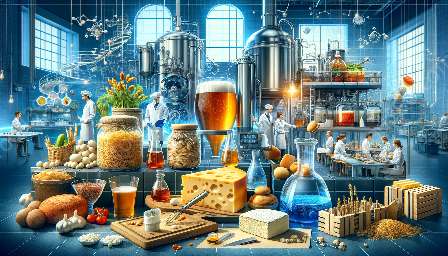Fermentation processes are a cornerstone of both fermentation science and the production of food and drink. This topic cluster will introduce you to the world of fermentation, covering the science behind it, its role in various industries, and its impact on our daily lives.
The Science Behind Fermentation
Fermentation is a natural process that breaks down complex substances into simpler compounds using microorganisms such as bacteria, yeasts, or fungi. One of the most well-known examples of fermentation is the conversion of sugars into alcohol and carbon dioxide by yeast in beer and wine production. This process, known as alcoholic fermentation, has been utilized by humans for thousands of years in the production of alcoholic beverages.
Another crucial form of fermentation is lactic acid fermentation, which is responsible for the production of foods like yogurt, sauerkraut, and kimchi. In this process, bacteria convert sugars into lactic acid, which acts as a natural preservative and gives these foods their characteristic tangy flavor.
The science of fermentation encompasses various fields, including microbiology, biochemistry, and food science. Understanding the metabolic pathways of different microorganisms involved in fermentation is crucial for optimizing the production of fermented products and ensuring their safety and quality.
Role of Fermentation in Food and Drink Production
Fermentation plays a central role in the production of a wide range of food and drink products. In the realm of beverage production, fermentation is used to create an assortment of alcoholic and non-alcoholic drinks, from beer and wine to kombucha and kefir. The flavors, aromas, and textures of these beverages are often shaped by the specific fermentation processes employed, highlighting the artistry of fermentation in the creation of diverse drink options.
Moreover, fermentation is crucial in the production of various food items. Traditional fermented foods, such as cheese, bread, and pickles, rely on fermentation to develop their unique textures and flavors. Fermentation not only enhances the taste and nutritional value of these foods but also contributes to their extended shelf life, making them important components of global cuisines.
Fermentation in Industry and Biotechnology
Fermentation processes are not limited to food and drink production; they have found niche applications in industrial and biotechnological settings.
The pharmaceutical industry utilizes fermentation for the production of antibiotics, vaccines, and therapeutic proteins. The controlled growth of microorganisms under specific fermentation conditions allows for the efficient synthesis of these medically important compounds.
In biotechnology, fermentation is employed for the production of biofuels, enzymes, and various biochemicals with applications in agriculture, environmental remediation, and renewable energy production. The versatility of fermentation processes makes them indispensable in driving sustainable and eco-friendly solutions across diverse industries.
Fermentation and Our Daily Lives
While fermentation processes may seem distant from our daily lives, they actually have a profound impact on our well-being, culture, and environment.
Consuming fermented foods and beverages can promote gut health by introducing beneficial microorganisms to our digestive system. The probiotics and enzymes present in fermented products aid in digestion and may contribute to overall wellness.
Furthermore, fermented foods and drinks are deeply rooted in various cultural traditions around the world, enriching our culinary experiences and connecting us to our heritage and communities.
From reducing food waste through preservation to contributing to the sustainability of various industries, fermentation processes have far-reaching effects that influence our daily choices and the health of our planet.

